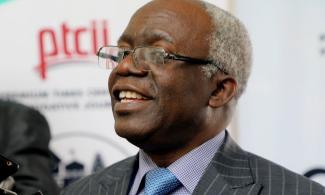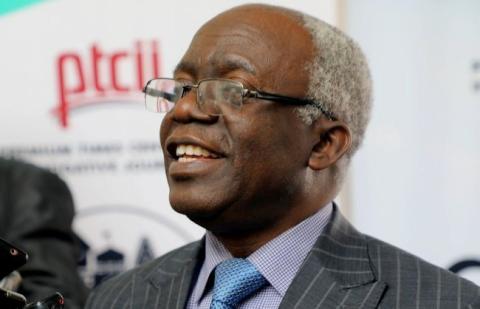
In the process, he has embarrassed the executive and exposed the judiciary to ridicule.

Since the release of Omoyele Sowore and Sambo Dasuki from illegal custody on December 24, 2019, the Attorney-General of the Federation and Minister of Justice, Mr Abubakar Malami (SAN), has put himself under undue pressure.
In the process, he has embarrassed the executive and exposed the judiciary to ridicule.
After announcing that he had directed the State Security Service to release Sowore and Dasuki from custody in compliance with the court orders that had granted them bail, the Justice Minister turned round to say that the release was an act of compassion and mercy on the part of the executive.
I was compelled to challenge the claim of the Justice Minister as he lacks the power to release any person standing trial on compassionate grounds by virtue of section 175 of the constitution.
After he had rightly abandoned that dangerous legal route, Mr Malami has since asserted that Nigerian Government was right to have detained Sowore and Dasuki in defiance of the court orders which had admitted them to bail. In support of the outlandish contention, the Justice Minister said that the government was not bound to obey the court orders until the final determination of the appeals filed against the court orders.
In an interview aired on NTA last Thursday, the Justice Minister said, "There were appeals (sic) for stay of execution all through.
"So, until those matters reach the Supreme Court and the apex court takes the final decision, relating there, you are still operating within the ambit and context of rule of law... So, in respect of those orders, we are not comfortable with as a government, we go back to the court and have them challenged. Until that matter, that your right of challenge, is determined up to the Supreme Court level, the idea of you being charged with disobedience of court order does not arise."
With respect, the minister's statement is factually and legally erroneous in every material particular. If the Justice Minister has had time to review Sowore's case file, which he had withdrawn from the State Security Service, he would have confirmed that no appeal was filed against the two decisions of the Federal High Court, which admitted him and his co-defendant, Mr Olawale Bakare, to bail. Instead of challenging the orders granting bail to Sowore and Bakare at the Court of Appeal, the State Security Service had actually attempted to constitute itself into an appellate court over the Federal High Court by insisting on approving the sureties that had been verified by the trial court.
As defence counsel, we rejected the illegal request to produce the sureties before the Director-General of the State Security Service until Justice Ijeoma Ojukwu gave him a 24-hour ultimatum to release the duo from illegal custody.
It is on record that Dasuki was granted bail at different times by six judges of the Federal High Court and the Federal Capital Territory High Court.
It is pertinent to note that the Nigerian Government did not file an appeal against any of the six court orders. In fact, the first bail application of Dasuki was not opposed by Mohammed Diri Esq., who was the then Director of Public Prosecutions from the chambers of the Attorney-General of the Federation. Hence, Dasuki was admitted to bail in self recognisance on August 30, 2015. Having not opposed the bail application, government could not have filed any appeal against the order of the court.
Apparently frustrated with the contemptuous conduct of the Nigerian Government, Dasuki approached the ECOWAS Court for redress. In a landmark judgment delivered on October 4, 2018, the ECOWAS court indicted Nigeria and awarded N15m damages in favour of Dasuki for his detention in defiance of the orders of Nigerian courts. According to the judges of the court, "It appears that the sole aim of the re-arrest is to circumvent the grant of bail and by keeping the applicant in custody through executive fiat unsupported by any law or order of court."
On the allegation that Dasuki was facing a serious charge of the criminal diversion of the sum of $2.1bn for purchase of arms, the ECOWAS Court said that, "For the avoidance of doubt, any persons, who have violated the criminal laws of a state especially the ones impeding the development of the state and destruction of its commonwealth are liable to be tried and if found guilty should face the consequences of their action(s). However, in doing so, states must respect all international obligations with regard to due process and respect for fundamental rights of the suspects. Failure to do so will impute responsibility to the state regarding such violations of rights while leaving intact their right to prosecute and punish offences against their criminal laws."
It is submitted that the Nigerian Government could not have filed an appeal against the judgment because the ECOWAS Court is a judicial tribunal of first and last resort, without any right of appeal.
However, after the judgment of ECOWAS Court, Justice Ijeoma Ojukwu of the Federal High Court had cause to admit Dasuki to another bail but asked each of his two sureties to deposit N100m with the court. The government did not file an appeal against the ruling but Dasuki did as he was completely dissatisfied with the suffocating conditions attached to his bail. The appeal was decided in Dasuki's favour as the bail conditions were varied in liberal terms by the Court of Appeal. The Nigerian Government never approached the Supreme Court to challenge any aspect of the judgment of the Court of Appeal.
In the same vein, the government did not file any appeal against any of the orders of the high courts, which had admitted Sowore and Dasuki to bail. Consequently, no motion was ever filed for stay of execution of any of the court orders. Since no notice of appeal or motion for stay of execution was ever filed by the government against the orders of bail for Sowore and Dasuki, the Justice Minister ought to tender a public apology for misleading the Nigerian people.
However, if the Justice Minister can produce any notice of appeal or motion for stay of execution in respect of the two cases, I will publicly apologise to him for misleading the Nigerian people.
From the foregoing, it is undoubtedly clear that the two orders of the Federal High Court admitting Sowore to bail were treated with contempt while the eight orders of the Federal High Court, Federal Capital Territory High Court, ECOWAS Court and the Court of Appeal, which admitted Dasuki to bail were ignored by the Nigerian Government based on erroneous legal advice.
A couple of weeks ago, I had reminded the Justice Minister of the fact that as a military dictator, Major-General Muhammadu Buhari had complied with court orders by releasing 13 political detainees from the illegal custody of the notorious National Security Organisation (now State Security Service) based on the legal advice of his Attorney-General, the late Chief Chike Offodile (SAN).
Even under the dreaded Sani Abacha junta, the law was not totally silent. Hence, when I was detained in 1996 under the State Security (Detention of Persons) Decree No 2 of 1984 at the Mawadachi Prison in Jigawa State, the Federal High Court granted an order permitting my wife to visit me. And upon the service of the order on the government, the then Attorney-General and Minister of Justice, the late Chief Michael Agbamuche (SAN), advised the prison authority to comply with the court order. At about the same time, Mr Agbamuche equally advised the Abacha junta to comply with the order of the Court of Appeal permitting the wife and personal physician of the Late Chief Gani Fawehinmi (SAN) to visit him in the Bauchi Prison. It is on record that the Abacha junta complied with both court orders in line with the advice of the Justice Minister.
Therefore, if the court orders issued in favour of the opponents of military dictators were respected under the defunct military regime, it is unacceptable for a democratically elected government, which operates under the rule of law to ignore the orders of municipal and regional courts for the release of political detainees and criminal suspects from illegal custody.
In as much as the eventual release of Sowore and Dasuki is appreciated, it ought to be pointed out that this is a mere tip of the iceberg. If the Nigerian Government has genuinely decided to embrace the rule of law, it has to comply with all valid and subsisting court orders and respect the human rights of the Nigerian people. As a matter of urgency, the Justice Minister should direct the authorities of the Nigeria Police Force, Nigeria Correctional Service, State Security Service, armed forces, anti-graft agencies and other law enforcement agencies to either release or prosecute the thousands of criminal suspects including terror suspects that have been incarcerated for months without trial. The detaining authorities should also be prohibited from parading suspects and subjecting them to physical and mental torture in contravention of the provisions of section 2 of the Anti Torture Act, 2017.
Furthermore, the Council of the National Human Rights Commission, which was dissolved in 2015 should be reconstituted by the President on the recommendation of the Justice Minister. In June last year, President Buhari directed the office of the Attorney -General, the Inspector-General of Police and the National Human Rights Commission to carry out the reforms of the Special Anti Robbery Squad of the Police within three months. It is high time the directive was carried out. The Georgewill Judicial commission of Inquiry, which investigated human rights abuses in the armed forces submitted its report in February 2018. The government should issue a white paper on the report forthwith. The Garba Judicial Commission of Inquiry, which investigated the military invasion of Zaria in December 2015 recommended the prosecution of the military officers, who massacred 347 Shiites and buried their bodies in a mass grave. The indicted suspects should be charged with culpable homicide at the Kaduna State High Court without any further delay.
Owing to the refusal of the Nigerian Government to act on these reports by prosecuting those, who bear full responsibility for such eggregious human rights infringements, the office of the Special Prosecutor of the International Criminal Court has concluded arrangements to open preliminary investigation into allegations of crimes against humanity concerning the extrajudicial killings of members of the Islamic Movement in Nigeria, and Indigenous People of Biafra. It is hoped that the government will not allow Nigeria to be exposed to international opprobrium for her unwillingness and inability to prosecute the indicted murder suspects.